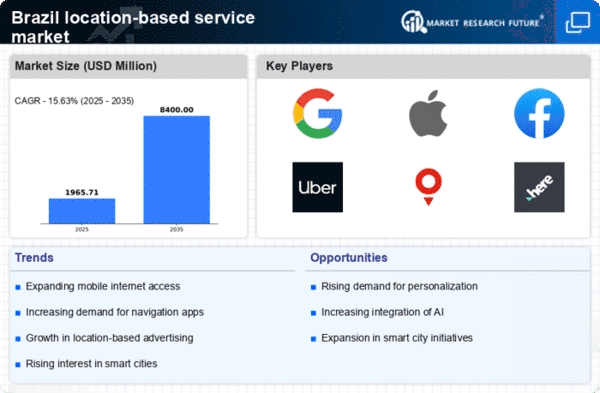Rising Smartphone Penetration
The increasing penetration of smartphones in Brazil is a pivotal driver for the location based-service market. As of 2025, approximately 85% of the Brazilian population owns a smartphone, facilitating access to various location-based applications. This trend indicates a growing reliance on mobile technology for navigation, local services, and personalized marketing. The widespread use of GPS-enabled devices enhances the effectiveness of location-based services, allowing businesses to target consumers more accurately. Moreover, the proliferation of affordable smartphones has democratized access to these services, enabling small and medium enterprises to leverage location data for competitive advantage. Consequently, the location based-service market is likely to experience substantial growth as more users engage with mobile applications that utilize location data.
Consumer Demand for Personalization
The increasing consumer demand for personalized experiences is a crucial driver for the location based-service market. Brazilian consumers are becoming more accustomed to tailored services that cater to their preferences and behaviors. Businesses are leveraging location data to create personalized marketing campaigns, promotions, and recommendations based on users' geographical locations. This trend is particularly evident in retail, where location-based offers can significantly enhance customer engagement and drive sales. As consumers seek more relevant and timely interactions with brands, the location based-service market is likely to expand, encouraging businesses to invest in technologies that facilitate personalized experiences. The ability to deliver targeted content based on location not only improves customer satisfaction but also fosters brand loyalty.
E-commerce Growth and Delivery Services
The rapid growth of e-commerce in Brazil is a significant driver for the location based-service market. In 2025, e-commerce sales are projected to reach approximately $30 billion, with a substantial portion attributed to local delivery services. Businesses are increasingly utilizing location data to optimize delivery routes and enhance customer experience. This trend indicates a shift towards more personalized and efficient service offerings, as consumers expect timely deliveries and real-time tracking of their orders. The integration of location-based services into e-commerce platforms allows companies to provide tailored recommendations and promotions based on users' geographical locations. As the e-commerce sector continues to expand, the location based-service market is likely to see increased investment and innovation.
Urbanization and Infrastructure Development
Brazil's ongoing urbanization and infrastructure development significantly influence the location based-service market. With over 85% of the population residing in urban areas, the demand for efficient navigation and local services is paramount. The government has invested heavily in transportation infrastructure, including smart traffic management systems and public transport enhancements. This investment not only improves accessibility but also creates opportunities for location-based services to thrive. For instance, real-time traffic updates and location-aware public transport applications are becoming increasingly popular among urban dwellers. As urban areas continue to expand, the location based-service market is poised to benefit from the growing need for innovative solutions that cater to the complexities of urban living.
Government Initiatives and Smart City Projects
Government initiatives aimed at developing smart cities in Brazil are driving the location based-service market. Various municipalities are implementing smart city projects that leverage technology to improve urban living conditions. These projects often include the deployment of IoT devices and data analytics to enhance public services, such as waste management and traffic control. By integrating location-based services into these initiatives, cities can provide residents with real-time information and services tailored to their needs. For example, location-aware applications can help citizens find available parking spaces or report issues to local authorities. As these smart city projects gain momentum, the location based-service market is expected to grow in tandem, fostering innovation and improving quality of life.
















